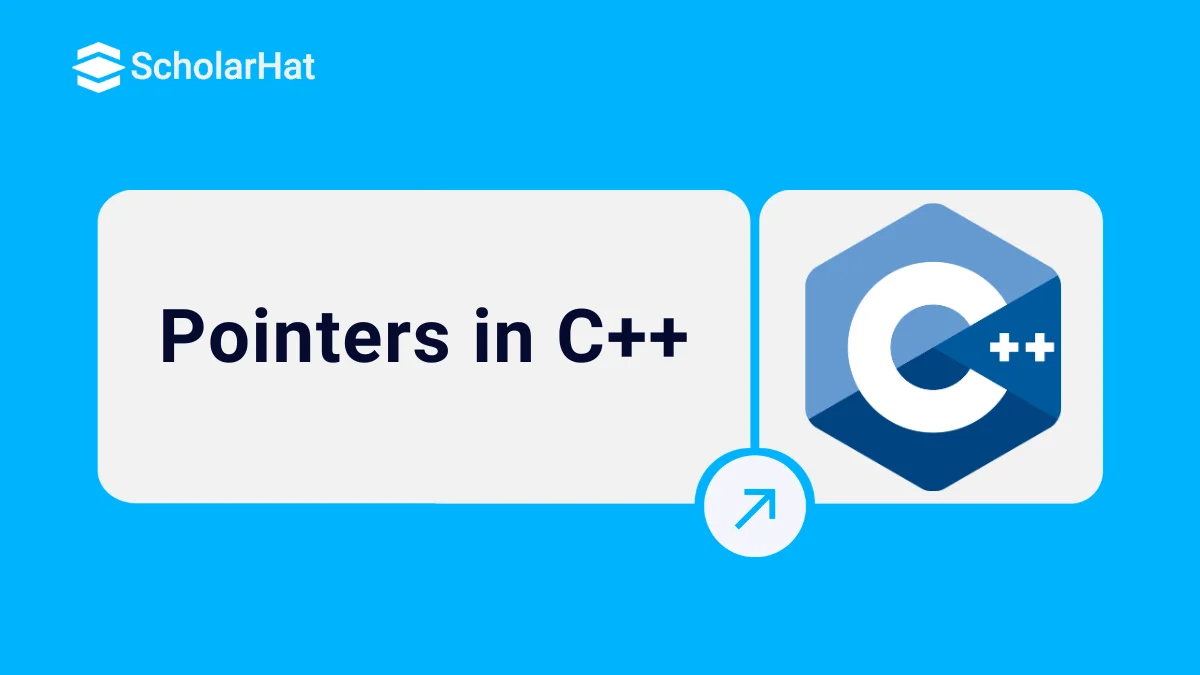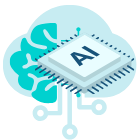27
FebPointers in C++: Declaration, Initialization and Advantages
Pointers in C++
Pointers in C++ point to the memory location of another variable. They let us access any location in the computer's memory, acting as variables.
In this comprehensive C++ tutorial, we'll take you on a guided tour of pointers in C++, their uses, declaration, initialization, and types of pointers, as well as modify the values of pointers. In addition to the insights shared in this article, consider taking advantage of C++ Full Course Free to enhance your knowledge and proficiency.
What are Pointers in C++?
Pointers are variables that contain the memory address of another variable instead of a direct value. Such variables can be of type. int, float, char, etc. By referencing this memory address, programmers can access and modify data indirectly.

Use of Pointers in C++
- Dynamic memory allocation - In the C++ programming language, the programmers can dynamically allocate memory by using the
malloc()andcalloc()functions, mainly where the pointer is used. This is the primary use of pointers in C++. - Arrays, Functions, and Structures - Pointers in the c ++ programming language are widely used in
arrays,structures, andfunctions. It reduces the code and improves the performance of that particular program.
Pointer Declaration in C++
We do not initialize the pointer; we declare it using the * (asterisk symbol) before a pointer's name or after the data type. This asterisk sign acts as the ticket to enter the address of the variables. If a pointer has an asterisk with it, it will show the value of the variable.
Syntax
datatype *var_name;datatype* var_name; //preferred syntax
Example
int *a;//pointer to intint* a;//pointer to int
Read More - C++ Interview Interview Questions and Answers
Pointer Initialization in C++
The procedure of initializing a pointer is where we give the memory address of another variable using the& (address of) operator.Example
#include <iostream>
using namespace std;
int main() {
int x = 42; // Declare and initialize an integer variable 'x'
// declare pointer variable 'ptr' and initialize it with the address of 'x'
int *ptr = &x;
// print value of x
cout << "x = " << x << endl;
// print address of x
cout << "Address of x (&x) = " << &x << endl
<< endl;
// print pointer ptr
cout << "ptr = " << ptr << endl;
// print the content of the address ptr points to
cout << "Content of the address pointed to by ptr (*ptr) = " << *ptr << endl;
return 0;
}
In this C++ code,
- an
integervariable,xis initialized to 42 - a pointer,
ptris created to holdx'saddress in memory.
Output
x = 42
Address of x (&x) = 0x7ffeb5f7b3c4
ptr = 0x7ffeb5f7b3c4
Content of the address pointed to by ptr (*ptr) = 42
* used in the above example can confuse you. It serves two purposes:
- When used in the declaration (
int *a), it creates a pointer variable. - When not used in the declaration (
*a), it acts as a dereference operator.
Modifying Values Pointed by Pointers
Example
#include <iostream>
using namespace std;
int main() {
int x = 42; // Declare and initialize an integer variable 'x'
// declare pointer variable 'ptr' and initialize it with the address of 'x'
int *ptr = &x;
// print value of x
cout << "x = " << x << endl;
// print *ptr
cout << "*ptr = " << *tr << endl
<< endl;
cout << "Changing value of x to 70:" << endl;
// change value of x to 70
x = 70;
// print x
cout << "x = " << x << endl;
// print *ptr
cout << "*ptr = " << *ptr << endl
<< endl;
cout << "Changing value of *ptr to 60:" << endl;
// change value of ptr to 60
*ptr = 60;
// print x
cout << "x = " << x << endl;
// print *ptr
cout << "*ptr = " << *ptr << endl;
return 0;
}
In the above C++ code in C++ Compiler, ptr points to the address of x. Therefore
- when value of
xis changed,*ptralso gets changed - when
*ptris modified, value ofxalso gets modified
Output
x = 42
*ptr = 42
Changing value of x to 70:
x = 70
*ptr = 70
Changing value of *ptr to 60:
x = 60
*ptr = 60Read more: Call by Value and Call by Reference in C++
Types of Pointers in C++
1. NULL Pointer
A NULL pointer indicates that it has not been initialized and points to nowhere in memory.
Syntax
int* nullPointer = NULL;Example of NULL Pointers in C++ Online Editor
#include <iostream>
using namespace std;
int main() {
int *ptr = nullptr;
if (ptr == nullptr) {
cout << "This pointer is called the null pointer." << endl;
}
return 0;
}
Output
This pointer is called the null pointer. 2. Integer Pointers
The memory location of an integer variable is stored in integer pointers.
Syntax
int* intPointer;Example of Integer Pointers in C++
#include <iostream>
int main() {
// Declare an integer variable
int num = 42;
// Declare an integer pointer and initialize it with the address of the variable
int *ptr = #
// Access the value using the pointer
std::cout << "Value of num: " << *ptr << std::endl;
// Modify the value using the pointer
*ptr = 100;
// Display the modified value
std::cout << "Modified value of num: " << num << std::endl;
return 0;
} Output
Value of num: 42
Modified value of num: 100
3. Array Pointer
The initial element of an array may be referenced by array pointers. It is applicable for random access of the array elements by using the pointer instead of the array indices. A pointer not only stores the memory address of the first element of an array but is also associated with the element type of the array. This means that the pointer "knows" the type of data it points to, enabling it to access and manipulate the array elements correctly.
Syntax
int arr[5];
int* arrPointer = arr;Example of Array Pointers in C++
#include <iostream>
int main() {
int arr[] = {10, 20, 30, 40, 50};
int* p = arr; // Array pointer to the first element of arr
for (int i = 0; i < 5; i++) {
std::cout << *(p + i) << " "; // Accessing array elements through pointer arithmetic
}
std::cout << std::endl;
return 0;
}
Output
10 20 30 40 50
4. Function Pointers
You can call functions indirectly by using function pointers that save the address of a function.
Syntax
int (*funcPointer)(int, int);Example of Function Pointers in C++
#include <iostream>
// Define two functions with the same signature
int add(int a, int b) {
return a + b;
}
int subtract(int a, int b) {
return a - b;
}
int main() {
// Declare a function pointer with the same signature as the functions
int (*operation)(int, int);
// Initialize the function pointer with the address of the add function
operation = add;
// Use the function pointer to call the add function
int result = operation(10, 5);
std::cout << "Result of addition: " << result << std::endl;
// Reassign the function pointer to the subtract function
operation = subtract;
// Use the function pointer to call the subtract function
result = operation(10, 5);
std::cout << "Result of subtraction: " << result << std::endl;
return 0;
}
Output
Result of addition: 15
Result of subtraction: 5
5. void Pointer
Void pointers can point to any data and can be typecasted to any type. It doesn’t have an associated data type. It can hold the address of a data type of integer, a float, or a string.
Syntax
void* voidPointer;
Example of void Pointers in C++
#include <iostream>
using namespace std;
int main() {
int x = 105;
float y = 89;
void *p = nullptr;
p = &x;
cout << "Integer value: " << *(static_cast(p)) << endl;
p = &y;
cout << "Float value: " << *(static_cast(p)) << endl;
return 0;
}
Output
Integer value: 105
Float value: 89
6. Structure Pointer
A structure pointer points to the address of a structure. Pointers to structures help in dynamic memory allocation, passing function parameters to big structures with less overhead and data structures, such as linked lists and trees.
Syntax
struct MyStruct {
int data;
};
struct MyStruct* structPointer;Example of Structure Pointer in C++ Online Compiler
#include <iostream>
#include <cstring>
using namespace std;
struct Employee {
int id;
char name[20];
};
int main() {
Employee *ptr = new Employee; // Dynamically allocate memory for one Employee struct
// Access struct members through pointer
ptr->id = 789;
strcpy(ptr->name, "Sourav Kumar");
cout << "Employee ID: " << ptr->id << endl;
cout << "Employee Name: " << ptr->name << endl;
delete ptr;
return 0;
}
Output
Employee ID: 789
Employee Name: Sourav Kumar
7. Double Pointers
Double pointers are pointers to pointers, i.e., they point to the memory address of another pointer and are frequently employed in linked lists or multi-dimensional arrays.
Syntax
int** ptr; // Declaration of a double pointer to an integer
Example of pointer to pointer in C++
#include <iostream>
int main() {
int value = 50;
int* singlePtr = &value; // Pointer to an integer
int** doublePtr = &singlePtr; // Double pointer to an integer pointer
std::cout << "Value: " << value << std::endl;
std::cout << "Single pointer points to value: " << *singlePtr << std::endl;
std::cout << "Double pointer points to single pointer: " << **doublePtr << std::endl;
return 0;
}
Output
Value: 50
Single pointer points to value: 50
Double pointer points to single pointer: 50
Advantages of using Pointers in C ++
There are a few advantages to using pointers in C ++
- Pointers help to reduce the code and improve the performance of the program. It mainly assists in retrieving
trees,strings, and many more. Pointers are primarily used witharrays,functions, andstructures. - The programmer or user can return multiple values from a particular function with the help of the
pointer Pointershelp users access any memory location in the computer's memory.
Summary
Pointers are a powerful tool in C++, but they can be challenging to use correctly. If you're new to pointers, start by reading this C++ Certification Training guide and experimenting with them in your programs. Your ability to code for practical and feature-rich programs will improve as a result of understanding C++ pointers and practicing with examples.
90% of tech giants prefer React.js experts for high-impact roles. Enroll in our React Certification Course today or risk being overlooked.
FAQs
int* ptr = &value;
int* ptr = new int; // Allocates memory for int and returns a pointer to it
delete ptr; // Frees the allocated memory










